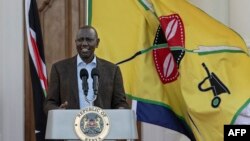There has been widespread public anger among Kenyans over plans for a raft of tax hikes including on food and fuel expected to generate an extra $2.1 billion in revenue.
And just as Treasury Minister Njuguna Ndung'u began reading the budget, lawmakers allied with opposition leader Raila Odinga's coalition walked out of the chamber to cheers and jeers.
"We have to have some short-term sacrifices for us to achieve the long-term. We have to sacrifice for the future," Ndung'u had told local station Citizen TV earlier on Thursday.
Ruto's maiden budget is a 3.6-trillion shilling ($25.7 billion) spending plan for 2023/24 with new or increased taxes outlined in a separate finance bill expected to generate $2.1 billion in revenue.
Ruto is seeking to replenish the government's coffers and repair a heavily-indebted economy inherited from his predecessor Uhuru Kenyatta, who splurged on major infrastructure projects.
Kenyans are already feeling the pinch from soaring prices for basic necessities, along with a sharp drop in the value of the local currency and the worst drought in four decades.
Economic growth slowed last year to 4.8 percent from 7.6 percent in 2021, reflecting the global fallout from Russia's invasion of Ukraine and the drought buffeting the vital agriculture sector.
Kenya is also sitting on a public debt mountain of almost $70 billion or about 67 percent of gross domestic product (GDP), and its repayment costs have jumped as the shilling sinks to record lows of more than 139 to the dollar.
Ruto has said that the finance bill, which sailed through a second reading in parliament on Wednesday, will ease the debt burden, stimulate the economy and create jobs in the East African nation.
The proposed legislation calls for new or increased taxes on a wide range of basic items including fuel and food, as well as mobile money transfers, beauty products and digital content.
One of the most contentious provisions is a 1.5 percent levy on the salaries of all tax-paying Kenyans to fund an affordable housing program.
Opponents have warned the new measures will further hit people already struggling to make ends meet as the cost of living crisis bites.
Opposition leader Raila Odinga's Azimio alliance on Wednesday described the budget as "deeply flawed" and said it "prolongs and worsens the suffering of the people."
Earlier this year, the opposition staged several anti-government protests over the cost of living crisis which degenerated into sometimes deadly street clashes between police and demonstrators.
An opinion poll published in the leading newspaper Daily Nation on Wednesday found that 90 percent of Kenyans were opposed to the finance bill.
The International Monetary Fund (IMF) has nevertheless hailed the government for responding "promptly" to the economic challenges it faces and for "prudent" spending.
In May, the IMF said it had reached a preliminary agreement with Kenya that would provide the government with access to another $1 billion in credit - increasing its total commitments to $3.52 billion.











Forum